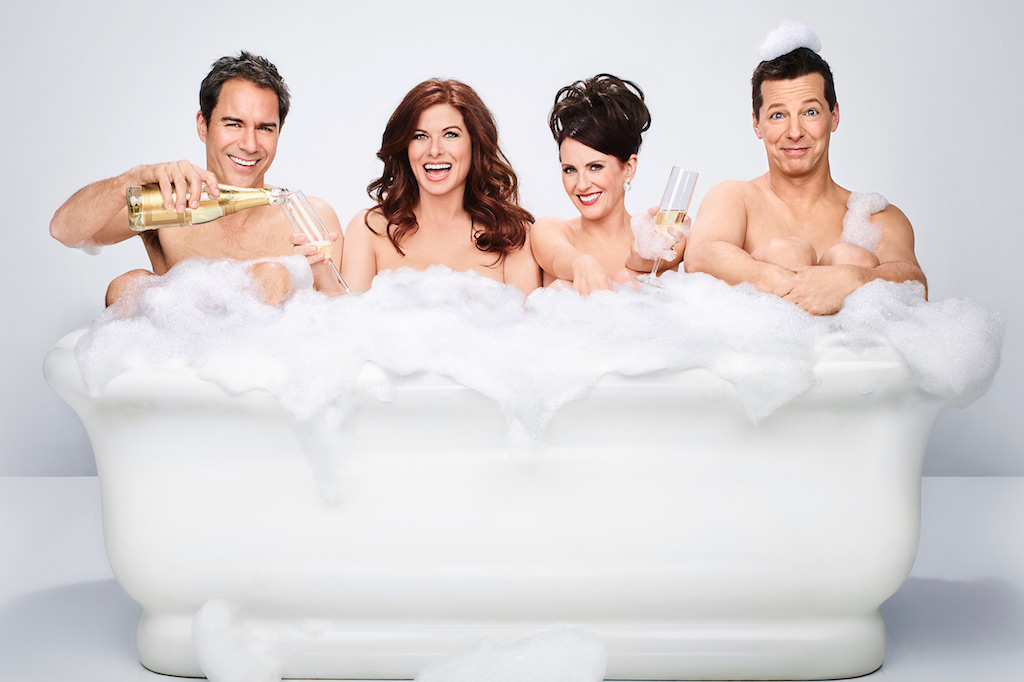How Progressive Was ‘Will & Grace’ And What Can We Hope For From The Series Reboot?
It was the first mainstream sitcom to give gay characters the spotlight.


Will & Grace is back from September 29, only on Stan.
“Something tells me the baby oil is actually going to be used on babies this year.”
That’s the response Will Truman (Eric McCormack) has upon realising that his friends Joe and Larry, once famous for their wild, implicitly orgiastic parties, have become settled, thirty-something gay dads. One of the most striking things about re-watching Will & Grace is how many filthy references were crammed into a hit network sitcom that ran between 1998 and 2006.
When the NBC series premiered, Ellen DeGeneres had only come out a year prior, leading to major backlash. Guest star Chaz Bono complained that Ellen became “so gay” that it was “excluding a large part of our society”. Will & Grace nevertheless put its gayest foot forward, and somehow survived the “Friends will end someday!” programming panic that wracked NBC for years to come.
That it did so in spite of hostile public opinion toward queer people writ-large – American support for same-sex marriage hovered between 30 and 40 per cent while the show was airing – was something of a miracle. There’s no question that its very existence broke ground, but just how progressive was it?
Leading The Conversation
As with all things, progressiveness in art is relative, but by most standards, Will & Grace repeatedly led a conversation that was not being widely held elsewhere. One of the major achievements of the series was to translate the gay experience to people who had no prior familiarity with it. Much ink has been spilled over the diametric opposition of the Will and Jack (Sean Hayes) characters and it remains a fascinating microcosm.
Will & Grace succeeded in its characterisations of Will and Jack because it understood, at its core, that the garden of queerdom is overrun with unique flowers that all grew from the same soil. Late in the first season, the show confronts Will’s discomfort with Jack’s high-frequency, polyamorous flamboyance head-on. In “Will Works Out”, Jack tags along to Will’s gym where he works out alongside his clients. Will, the rich gay lawyer, tells Grace (Debra Messing) that Jack is sometimes “just such a… fag.”
Jack overhears and responds by sauntering into the gym in a basketball jersey and backwards cap, a Frankenstein’s monster of masculine archetypes. Will & Grace had remarkably free reign when it came to language – occasionally for the worse – but it was used smartly here, suggesting ownership of the word and discouraging its use outside of comfortable dynamics. This masc/femme dichotomy still plays out among gay men today, making Jack’s mic-drop line extra-resonant: “I’d rather be a fag than afraid.”
That episode’s exploration of internalised homophobia and shame would recur throughout later seasons, often in concert with familial discomfort.
Putting Gay People Onscreen
In season two, Will discovers that his father has told all his co-workers that Will is married to Grace, while Jack, of all people, is forced to admit his sexuality to his mother after being caught in a similar lie.
In season three, Will dates Matt (a role played by Patrick Dempsey), who repeatedly introduces Will as his brother. Will & Grace was less about conscious standard-bearing than it was gay men figuring out how to exist in a world that had granted them more visibility and power than ever before (as it had creators Max Mutchnick and David Kohan). It wasn’t a diverse slice of life, but it had never truly been seen before and actually cast gay actors as gay characters.
The show was most aware of this with season two episode “Acting Out”, which saw Jack scandalised by a major TV network’s embarrassed refusal to air a promised momentous gay kiss. In response, he and Will find themselves in front of a Today show camera, kissing – though unromantically. It would be two months later, on Dawson’s Creek, that the first proper gay make-out sesh first aired in prime time.
What’s Next?
What, then, can we expect from the reboot? It’s crucial to acknowledge that most of Will & Grace aired in Bush’s America – yet the show helped to move the needle of support in favour of equality. In fact, three years after Will & Grace ended its first run, the Democratic Party’s then-Vice President Joe Biden gave the show credit for changing his, and others’, opinions of same-sex marriage.
Bringing the show back in more politically auspicious times wouldn’t have made sense, but something about the series’ brash, devil-may-care politics feels right for this moment, with the character of Karen Walker (Megan Mullally) even positioned as a Trump supporter. Messing has acknowledged their need to update the series on this front: “When we started…we were ‘LGB,’ but we stopped at B. My hope is we can now finish the alphabet.”
The unpleasantly sexless gay representation of Modern Family has for years proved how well Will & Grace made the mould for mainstream gay representation. Alongside it and in its absence, streaming and cable networks have forged ahead in terms of humanistic portrayals of queer people, but for as lauded as Transparent is, it’s more niche-appeal. Will & Grace broke that mould to reach and resonate with a lot of people, and with the reboot just around the corner on Stan, we may well see a new one forged yet.
—
Your fave groundbreaking show is back this month, with new episodes of Will & Grace streaming on the same day as the U.S. from 29th September, only on Stan. Get ready – re-live the original magic and binge all 8 seasons now.